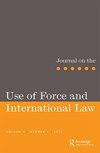Strengthening the Rule of Law through the UN Security Council
Q3 Social Sciences
Journal on the Use of Force and International Law
Pub Date : 2017-07-03
DOI:10.1080/20531702.2017.1379279
引用次数: 8
Abstract
This work represents the tenth instalment within a series of academic volumes examining the challenges presented by the emergence of globalisation on the geo-political scene. The series claims to make two significant contributions: first, dissecting the liberal democratic values which have served to form modern constructs of the civilised world; and, second, identifying what international institutions are best positioned ultimately to realise those values in an increasingly globalised world. The present contribution focuses upon the international community’s commitment to promoting the rule of law (ROL) – primarily through the premier mechanisms of the United Nations Security Council (peacekeeping, sanctions and force). Conversations on ROL theories naturally play a vital role within the confines of maintaining peace. Here, the authors show that ROL must also be equally applied to conversations regarding securing peace (e.g. through the use of force). While traditional ad bellum literature tends to examine parameters governing the use of force, this work shines a focus on reforming the systems and bodies which actually utilise the force. Based on this journal’s natural remit, special emphasis will be placed upon the authors’ discussion concerning the interplay between the ROL and the use of force. The present entry is conveniently divided into five easily digestible sections. From the onset, the editors present ROL as the antithesis to the use of force. In essence, efforts to ensure ROL serve as a means to maintain and regulate peace (1). While Part I seeks to provide a cursory review of the theories behind a contemporary understanding of the ROL, Parts II through to IV delve into how the UN Security Council (UNSC) attempts to implement the ROL in today’s world. Finally, Part V takes a look into future challenges and how the ROL can ultimately be strengthened through the dictates of the Security Council by presenting a list of policy proposals. While maintaining peace through ROL is the clearly defined target, the work is not naive in arguing that the utilisation of force is no longer necessary or can be conveniently avoided. To the contrary, the latter chapters focus explicitly on taking ROL concepts and applying them to the much more通过联合国安理会加强法治
这项工作是一系列学术卷的第十部分,研究全球化在地缘政治舞台上的出现所带来的挑战。该系列声称做出了两项重大贡献:首先,剖析了形成文明世界现代结构的自由民主价值观;其次,确定哪些国际机构最适合在日益全球化的世界中最终实现这些价值观。目前的捐款集中于国际社会对促进法治的承诺,主要是通过联合国安理会的主要机制(维持和平、制裁和武力)。在维护和平的范围内,关于ROL理论的对话自然发挥着至关重要的作用。在这里,作者表明,ROL也必须同样适用于有关确保和平的对话(例如,通过使用武力)。虽然传统的战时文献倾向于检查控制使用武力的参数,但这项工作的重点是改革实际使用武力的系统和机构。基于本杂志的自然职权范围,特别强调将放在作者关于ROL和使用武力之间相互作用的讨论上。本条目被方便地分为五个易于理解的部分。从一开始,编辑们就把ROL作为使用武力的对立面。从本质上讲,确保ROL作为维持和规范和平的手段的努力(1)。第一部分试图对ROL的当代理解背后的理论进行粗略回顾,第二部分至第四部分深入研究了联合国安理会(UNSC)如何试图在当今世界实施ROL。最后,第五部分通过提出一系列政策建议,展望了未来的挑战,以及如何通过安全理事会的指令最终加强ROL。虽然通过ROL维持和平是明确的目标,但该工作并不天真地认为不再需要使用武力或可以方便地避免使用武力。相反,后面的章节明确地关注于采用ROL概念并将其应用于更多
本文章由计算机程序翻译,如有差异,请以英文原文为准。
求助全文
约1分钟内获得全文
求助全文
来源期刊

Journal on the Use of Force and International Law
Social Sciences-Law
CiteScore
1.10
自引率
0.00%
发文量
13
 求助内容:
求助内容: 应助结果提醒方式:
应助结果提醒方式:


